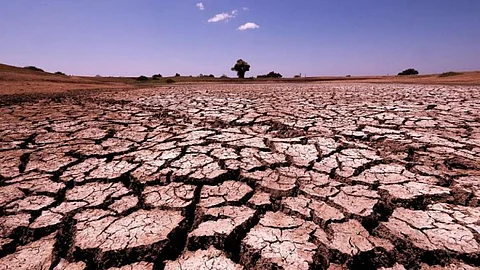
- Topics
- Feature
- Opportunities & Events
- Data
- Hindi Portal
- Topics
- Feature
- Opportunities & Events
- Data
- Hindi Portal

The Drought in Numbers, 2022 report released May 11 at the ongoing 15th Conference of Parties (CoP15) to the United Nations Convention to Combat Desertification (UNCCD) finds that the frequency and duration of droughts is increasing at an alarming rate across the world since the onset of the 21st century. India features in the report as one of the severely drought impacted countries.
Evidence shows that India’s drought-prone area has increased by 57 per cent since 1997 while one-third of India’s districts have faced more than four droughts over the past decade with 50 million people being affected by drought every year (Down to Earth)
A study finds that current environmental protection initiatives in South and Southeast Asia have failed to protect tree species and their valuable seed sources. India has the highest proportion of priority areas for restoration, where tree planting, assisted regeneration and agroforestry can provide many benefits.
The researchers recommend seed collection and storage to preserve genetic diversity and potential for assisted migration, especially in parts of India, Indonesia, Laos, Myanmar, Thailand and Vietnam as priority areas (Mongabay, India).
The Nanjarayan Tank, a bio-diversity hotspot, that has been declared as the 17th bird sanctuary of Tamil Nadu is located on the outskirts of Tirupur city near Koolipalayam, which is about 60 kilometres from Coimbatore.
The tank, built by the then local King Nanjarayan mainly for the purpose of irrigation, is a haven for migratory birds. However, the bird numbers are declining in recent years due to faulty restoration efforts and increasing water pollution due to draining in of effluents from dyeing units in the region.
A conservation centre is expected to come up near the water body to document the bird diversity, and watch towers, interpretation centres, walkways and a butterfly garden are also being planned near the biodiversity hotspot to increase public awareness and bring about a change in the state of the tank (The Hindu).
India’s food production could drop by 16 percent and the risk of hunger could increase by 23 percent by 2030 due to climate change, says a report by the International Food Policy Research Institute (IFPRI) on climate change and food systems.
The number of Indians at risk from hunger is expected to be 73.9 million in 2030 and, would increase to 90.6 million due to factors associated with climate change.
The average temperature across India is projected to rise by between 2.4°C and 4.4°C by 2100 while summer heat waves could triple by 2100 in India, majorly affecting food production (The Hindu)
The damage done by forest fires in Uttarakhand has more then tripled in the last four years. Uttarakhand is particularly vulnerable to the problem among the Himalayan states, where severity of forest fires has shown a steep rise. This has also been found to lead to an increase in the incidence of respiratory illnesses in the state.
This is because about 45 percent of the state is forested and it is located on the southern slope of the Himalayas, where it receives a large amount of sunlight, leading to more heating. However, human induced factors are also to blame. Environmentalists argue that overexploitation of natural resources, tourism and destruction of forests are further adding fuel to fire (The Third Pole).
This is a roundup of important news updates published from May 6 - May 23, 2022. Also read policy updates this fortnight